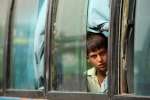- Text size
 |
|  |
|  |
| 
- Français
Mauritania repatriation operation picks up with second convoy
News Stories, 14 March 2008

ROSSO, Mauritania, March 14 (UNHCR) – The UN refugee agency has conducted a second repatriation convoy for Mauritanian refugees in Senegal as it steps up the operation launched in January.
On Thursday, 257 refugees from 61 families were transported from four refugee sites on the southern bank of the Senegal River, which they crossed by boat before reaching the Mauritanian town of Rosso. Upon arrival, and after completing administrative formalities, they were taken back to three locations in the neighbourhood of Rosso.
"The repatriation operation will be stepped up," said Nsona Vela Do Nascimento, head of the UNHCR office in the Senegalese town of Richard-Toll. "I am all the more happy that this second convoy has repatriated more than double the number of people on the first one."
The UNHCR operation to help some 24,000 Mauritanian refugees return home after almost 20 years in exile was launched on January 29, but technical and administrative hitches held up the organization of a second convoy.
With these problems now ironed out, the refugee agency hopes to increase the pace of voluntary returns and organize bi-weekly convoys to reach a target of 3,000 returns per month. The next convoy is expected to take place on Tuesday with some 438 returnees.
Cattle farmer Yoro Ali Diallo, echoing the thoughts of others on the convoy, said before leaving Senegal that he was overjoyed to finally be going back home with the help of UNHCR. "The reports we received from those who went back in January were positive, but I would like to judge for myself."
Another returnee, Hamadou Diallo, said he was overwhelmed by the warm welcome he and his extended family had received on arriving yesterday at a transit site near Rosso. The drums beat as the returnees and locals danced and feasted late into the night.
The two Diallos and their compatriots will receive an assistance package in Mauritania, including basic domestic items such as kitchen sets, blankets, buckets, mosquito nets, soap, as well as sanitary kits from UNHCR. Returnees are also given a three-month food ration from the World Food Programme.
Each household also receives a tent as well as some construction material. In places of return, reintegration projects are being organized in the health, water and education sectors. UNHCR's partners are also undertaking the rehabilitation or rebuilding of infrastructure that will benefit both returnees and the local communities.
The first voluntary repatriation convoy took back 103 Mauritanian refugees on January 29. In total, some 24,000 Mauritanian refugees live in northern Senegal and could benefit from UNHCR's assistance to return to their home country.
In April 1989, a long-standing border dispute between Mauritania and Senegal escalated into ethnic violence. Some 60,000 Mauritanians fled to Senegal and Mali.









































